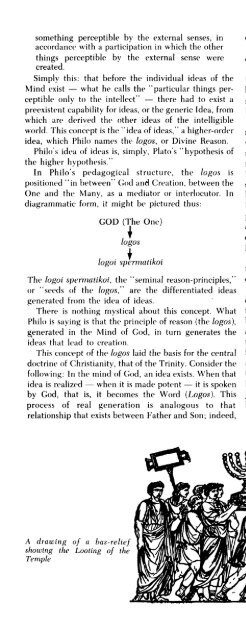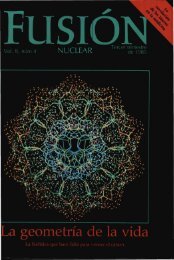You also want an ePaper? Increase the reach of your titles
YUMPU automatically turns print PDFs into web optimized ePapers that Google loves.
something perceptible by the external senses, in<br />
accordance with a participation in which the other<br />
things perceptible by the external sense were<br />
created.<br />
Simply this: that before the individual ideas of the<br />
Mind exist — what he calls the "particular things perceptible<br />
only to the intellect ' — there had to exist a<br />
preexistent capability for ideas, or the generic Idea, from<br />
which are derived the other ideas of the intelligible<br />
world. This concept is the "idea of ideas," a higher-order<br />
idea, which Philo names the logos, or Divine Reason.<br />
Philo's idea of ideas is, simply, Plato's "hypothesis of<br />
the higher hypothesis."<br />
In Philo's pedagogical structure, the logos is<br />
positioned "in between" God and Creation, between the<br />
One and the Many, as a mediator or interlocutor. In<br />
diagrammatic form, it might be pictured thus:<br />
GOD (<strong>The</strong> One)<br />
logos<br />
logoi spermatikoi<br />
<strong>The</strong> logoi spermatikoi, the "seminal reason-principles,"<br />
or "seeds of the logos," are the differentiated ideas<br />
generated from the idea of ideas.<br />
<strong>The</strong>re is nothing mystical about this concept. What<br />
Philo is saying is that the principle of reason (the logos),<br />
generated in the Mind of God, in turn generates the<br />
ideas that lead to creation.<br />
This concept of the logos laid the basis for the central<br />
doctrine of Christianity, that of the Trinity. Consider the<br />
following: In the mind of God, an idea exists. When that<br />
idea is realized — when it is made potent — it is spoken<br />
by God, that is, it becomes the Word (Logos). This<br />
process of real generation is analogous to that<br />
relationship that exists between Father and Son; indeed,<br />
often Philo described the logos as the "Son of God."<br />
<strong>The</strong> relationship to Christ, the Son of God, is already<br />
obvious.<br />
In the doctrine of the Trinity, the relation between the<br />
Father and the Son is one of love. That love, itself,<br />
becomes a generative, creative force that produces the<br />
so-called Holy Spirit, which is the representation of the<br />
Idea.<br />
For Philo and for the early Christian doctors, this is no<br />
more than a heuristic representation of the inner<br />
workings of the creative mind. Here, God is meant to<br />
represent the Mind itself. Inside that mind, the Father<br />
represents the thinking, creative knower, the "I" of the<br />
Mind. When the mind thinks about itself, using itself to<br />
study the working of the Mind itself, then the knower<br />
becomes also the known; that is, the "Thou" of the<br />
Mind is the mirror against which the "I" tests its thought<br />
processes, its hypothesis-forming processes, in order to<br />
achieve Reason and scientific certainty. <strong>The</strong>n, in the<br />
dialogue between the I and the Thou — between the<br />
Father and the Son — knowledge is generated.<br />
This is the basic doctrine of the Trinity, as stated even<br />
more clearly by Plotinus, Origen, and St. Augustine in<br />
centuries to come.<br />
In the Christian era, immediately following Philo, the<br />
logos-Trinity doctrine is adopted whole cloth. St. John's<br />
famous Gospel, beginning with the sentence, "In the<br />
beginning was the Logos, and the Logos was with God,<br />
and the Logos was God," expresses the idea exactly. But<br />
the Christians added a refinement to the idea, when John<br />
further states, "And the Logos was made flesh, and dwelt<br />
among us. For here, the Logos — Christ, the Son of<br />
God — is made concrete, for all to see. <strong>The</strong> universal is<br />
linked inextricably to the particular, God to Man; and<br />
John includes in his famous introduction: "And you shall<br />
become Sons of God."<br />
That was the message of Philo Judaeus.<br />
A drawing of a bas-relief<br />
showing the Looting of the<br />
Temple<br />
15

















